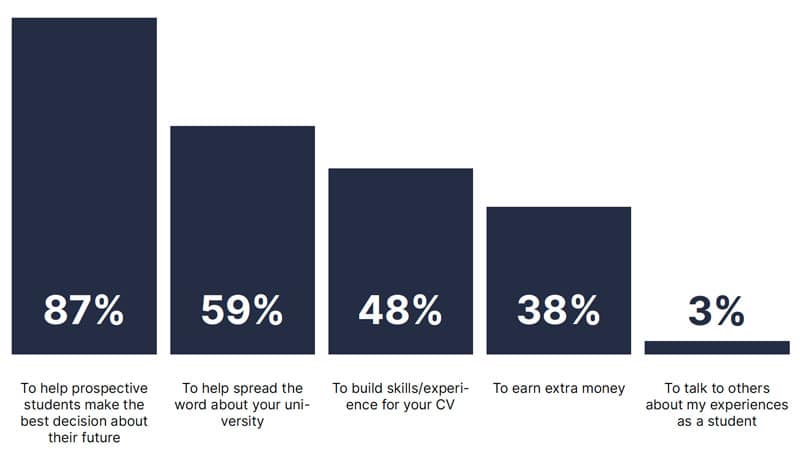How to build a better peer recruitment programme
- Current students or alumni have a key role to play in student recruitment and surveys clearly indicate that they are highly influential with prospective students
- A new whitepaper sets out key questions to consider when planning or expanding your student ambassador programme
Are you missing out on the power of peers or student ambassadors in your international recruitment effort? Some of the available data in this space suggests that many educators are, including those in major study destinations. An estimated two-thirds of UK universities engage peers – whether current students or alumni – in student recruiting. And the practice is even more widespread in Australia and New Zealand where up to 75% of universities report doing so. Similarly, a fall 2020 survey from the Institute of International Education found that nearly seven in ten (68%) of US colleges say they were using current students to help reach new international students.
This means, however, that there are still significant numbers of institutions and schools in major destinations that are not currently engaging peer-recruiters. And this is in spite of the fact that the impact of peer recruiters is really well established in student surveys, where a strong majority of prospective students consistently say that contacts with student ambassadors were highly influential in the students' choice of institution or school. "One of the earliest lessons I learned in college admissions was that our current students were our best recruiters," said industry consultant Marty Bennett during a recent webinar. "When I talk about recruiters, I'm talking about those who can sell your institution better than you can as an employee."
Also on the webinar panel, Ellis Platt, a student recruitment officer for Manchester Metropolitan University, added, "[Prospective students] appreciate the ability to communicate with peers, and often don't want to speak just to staff. They just want to gauge what their overall student experience will be like."
A new whitepaper from The Ambassador Platform (TAP) aims to demystify the process of building an effective peer recruitment effort, and sets out five key planning questions that educators can use to build or expand ambassador programmes.
- "What problem will a student ambassador program solve for us?" For many educators, the answer to this question will revolve around recruitment targets or conversion rates. But the underlying idea for any effective ambassador programme is simply that prospective students really value the chance to hear what current students (or alumni) have to say about the institution or school and the experience they have had.
- "How will we facilitate interaction between prospects and ambassadors?" For the most part, this will happen online via whatever channels students would normally use to talk with friends or other peers. But it probably starts with your inquiry process, and in creating opportunities for direct contact with peers for inquiring students. As Mr Platt points out, a lot of that contact will happen quite naturally. "Maybe the [prospective students] wouldn't have the confidence or see the need to bother a member of staff. But if they feel like they are just talking to a student, it's just like messaging a friend on WhatsApp or whatever. It's no big deal."
- "How much content will ambassadors be expected to produce, where will it go, and what form will it take?" This too will be student-led to a great extent, in the form of online chats and Q&As with prospective students. A recent TAP survey found that ambassadors are mostly asked about course details, admissions processes (and requirements), and housing. But ambassadors can also set down some foundation content as well, including published responses for frequently asked questions or even videos showing the campus, community, or (as in the example below) a typical day (or week) in the life at your institution or school.
- "Who will be responsible for managing the student ambassador team, the content they produce and the events they take part in?" While overall management of the peer programme will likely rest with recruitment managers or other international staff, senior ambassadors can also play a key role in supporting peer recruiters.
- "Does our budget allow for remuneration? If not, what can we offer?" A related survey of student ambassadors, also from TAP, offers some important insights on the question. As the following chart reflects, most ambassadors say they are motivated by the opportunity to assist students, boost the profile of their school, and gain work experience. Less than four in ten cited the chance "to earn extra money" as an important factor in their decision to become an ambassador. Just over half (56%) of ambassadors responding to the survey said they were paid by their institutions, the remaining 44% were not.

That finding again underscores the tremendous opportunity for every ambassador programme: prospects want to talk to current or former students and those same peers have a natural interest in assisting new students. Needless to say, that is a very strong foundation for starting or expanding an ambassador programme at any institution or school.
For additional background, please see:













